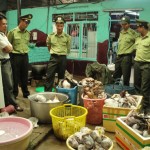![A total of 12 wildlife traffickers were arrested in Nepal in a span of just a few weeks. Photo By Lip Kee from Singapore, Republic of Singapore (Rhino female) [CC-BY-SA-2.0 (http://creativecommons.org/licenses/by-sa/2.0)], via Wikimedia Commons](https://annamiticus.com/wp-content/uploads/2013/05/Rhino_female_-_Flickr_-_Lip_Kee-500x400.jpg)
In less than a month’s time, Nepalese authorities have rounded up 12 suspects in three separate incidents for smuggling rhino horns and pangolin scales.
On April 27th, six rhino horn traders were arrested in Bardibas (Mahottari district). Bhishma Humagain, Inspector of Police at Bardibas Area Police Office told MyRepublica.com that Bindeshwor Saha, Ashok Lama, Dev Raj Waiba, Hemant Magar, Thagendra Moktan, and Vicky Oli were turned over to Chitwan National Park officials.
Just ten days later, a total of five people were arrested when police intercepted a bus headed to Tatopani from Kathmandu. Border police seized nine kilograms of pangolin scales and a sizeable amount of foreign currency. Sange Tamang‚ Maya Sherpa‚ and Pemba Sherpa were each carrying three kilograms of pangolin scales attached “to their thighs and other parts of the body with duct tape”, according to The Himalayan Times. In addition, foreign currency in the amounts of 78‚000 US dollars and 136‚000 Chinese Yuan was seized from suspects identified as Doma Sherpa and Chitra Bahadur Shrestha, who had tied the money to their waists.
Indra Bahadur Prasain of the Sindhulpalchok District Forest Office said in March 2013 that the Tatopani border point is part of a notorious smuggling route.
Smugglers from both India and China have been using this route to smuggle endangered plants and animal parts. These parts are being smuggled to India and China through the Tatopani border using Nepali territory.
Prasain added that smuggling at the Tatopani border point had been occurring since the 1960s, and “hinted at involvement of custom officials in the smuggling” of red sandalwood to China. He noted that the Rasuwa border point is another hub of concern.
And earlier this week, police raided the Chandranigahapur-based Sudarshan Hotel and arrested Birendra Yadav with a rhino horn. Yadav claimed he was unaware that there was a rhino horn in the bag given to him by Manoj Dhital of Rangapur VDC. Police are currently searching for Dhital.
In February 2013, one rhino was killed in Nepal’s Chitwan National Park.




![Pangolin Scales Seized in Hong Kong, 2 Arrested [Photos]](https://annamiticus.com/wp-content/uploads/2013/11/PangolinScalesHongKong02-150x150.jpg)